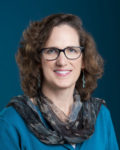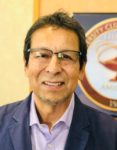

By KATHRYN P. DEROSE and REV. MICHAEL A. MATA
As Christians experienced Holy Week 2020, the week commemorating the trial, suffering, and death of Jesus, the somber tone such remembrances evoke took on new meaning in the midst of the COVID-19 epidemic with the catastrophic loss of life and livelihoods. Many churches remained physically closed, some already outfitted with sophisticated systems for live streaming and others scrambled, along with their congregants, to create meaningful virtual worship and fellowship opportunities. Finding ways to maintain physical distancing while still providing social and spiritual connections.
These challenges face people of other faiths as well since the current guidance regarding social distancing affected those observing Passover, April 8-16 and will likely affect Orthodox Easter, April 19 and Ramadan, which will start April 23.
Maintaining social and spiritual connections in the midst of COVID-19 are not the only challenges facing our communities of faith. For centuries if not longer, religious congregations have played critical roles in providing and supporting social services within communities. There are over 345,000 religious congregations in the US of various faiths and denominations and, despite declining rates of religious affiliation and attendance, national surveys still find a sizeable proportion – about 45% – of all adults report attending religious services at least monthly. Religious congregations play even more important roles in particular subgroups, such as low-income communities and among certain racial-ethnic minority groups and immigrants, the elderly, and other vulnerable groups, making faith-based organizations critical to the COVID-19 response in the short and long terms.
Congregations provide physical infrastructure and complex social networks that can be leveraged for a wide range of issues. They also provide access to informal support, food, health care, and educational and job opportunities through extended social networks and linkages with other community institutions. RAND Corporation research suggests that congregations play critical roles in underserved communities in the US addressing food insecurity, mental health and substance use, and veteran re-integration. RAND has partnered with faith-based organizations to develop health-related programs addressing issues such as HIV prevention and care, obesity, and prisoner re-entry, just to name a few. Oftentimes, faith communities’ social service programming are small, localized efforts that respond to acute community needs. But given congregations’ ubiquity, and the fact that most all sacred scriptures have something to say about service towards others and caring for the vulnerable, a broader and more coordinated role that is focused on addressing COVID-19 prevention and care needs could be extremely powerful.
The Centers for Disease Control and Prevention has created a resource page for faith-based organizations to plan, prepare, and respond to COVID-19. Mostly these involve guidance about in-person gatherings, mitigation strategies when a known COVID-19 case has been in the facility, and cleaning and disinfection recommendations. There is a nod to other roles these organizations can play – ensuring care and services for underserved populations with which organizations have experience working, and addressing rumors, misinformation, fear, and anxiety. There are few guidelines as to how to do this other than “coordinate with local health officials.” The extent to which such coordination can occur will partly depend on the prior established relationships between public health and religious groups, which varies widely across jurisdictions. However, even where such relationships exist it is inevitable that local health officials will be already overextended managing the immediate public health crisis.
Nonetheless, the need for such coordination is urgent given the unfolding pandemic, whose impacts are likely to be with us for some time. And some thought needs to be given to how religious congregations’ social service programs can be delivered safely. For example, food assistance is one of the most common ways that faith-based organizations support their communities. If volunteers staffing such efforts are older, they will not be available under shelter in place directives. Creative, coordinated efforts are needed to place able volunteers in programs that continue to serve, particularly where demand and need has increased.
In addition, longer term strategies for addressing food insecurity in the midst of COVID-19 are critical. One example is Seeds of Hope, the food justice ministry of the Episcopal Diocese of Los Angeles, which works to address food insecurity by putting farm-fresh fruits and vegetables directly into the hands of those in need. They currently serve more than 30,000 households per week in over 100 communities across six Southern California counties through a network of urban farms, food pantries, meal programs, and nutrition education/healthy cooking classes. Because of COVID-19, some aspects of their work – e.g., their in-person garden-based nutrition and cooking classes – had to be suspended but are now being put on-line. However, getting fruits and vegetables in the hands of their participants in a way that is safe has proved more challenging. Pre-packaging food bags for pick up is a short-term solution to avoid gatherings but can diminish the “farmers’ market” environment they have implemented to preserve dignity in contrast to traditional “handouts.” Longer-term, they are exploring a partnership to create an app that would allow participants to order what produce they want and have it delivered to their home, just what wealthier households have been able to do for decades only without the cost.
The needs being addressed by Seeds of Hope and other faith-based organizations – avoiding a tradeoff between paying rent and putting food on the table – will only become more dire during COVID-19, particularly in places like Los Angeles already facing a housing affordability crisis. We shouldn’t expect faith-based organizations to bear the majority of the burden – most congregations are small and staffed by volunteers. However, they should be seen as important partners in reaching and caring for the vulnerable. As faith-based and other community-based organizations become more adept and comfortable at using social media and virtual connections for social and spiritual solidarity through this crisis, the result may be stronger networks of relationships on personal, communal, and organizational levels. If we pay attention to the opportunity now, the COVID-19 epidemic may lay the groundwork for closer public service partnerships between local government and faith communities in the future, as well as an enhanced appreciation by congregants for the social justice role their faith traditions ask them to embrace.
Kathryn P. Derose is senior policy researcher at the nonprofit, nonpartisan RAND Corporation, a professor of health policy at the Pardee RAND Graduate School, and a member of the clergy in the Episcopal Diocese of Los Angeles.
Michael A. Mata is senior consultant with Freedom Road LLC, pastor in the Nazarene Church and practitioner in residence at the Pardee RAND Graduate School.
Categories: Uncategorized










“Methinks it would be better to rely on social service professionals employed by the government rather than faith-based organizations and charity!”
Yes, but then we’d have to pay a living wage and tax billionaires, instead of the wealthy getting tax deductions for charitable donations while patting themselves on the back for such generous “giving”.
Methinks it would be better to rely on social service professionals employed by the government rather than faith-based organizations and charity!